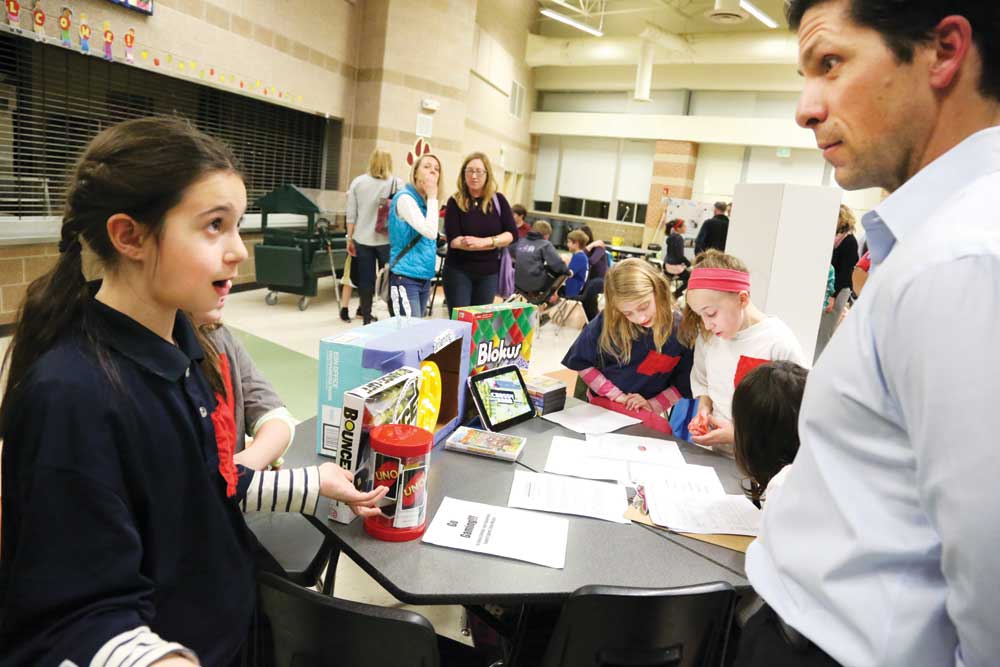
Chloe Mitzner explains the intricacies of her company, Go Gaming, to Aaron Alpert.
In a room full of fifth-graders, many engrossed with their computers and tablets, it wasn’t video games or social media they were focused on—it was business plans with cost and income projections, charts and product descriptions. The mock business owners at the Entrepreneur Expo at Bill Roberts School on Feb. 12 were the fifth-grade students in Robin Tobin’s gifted and talented class who worked in teams to create “real world” business plans.
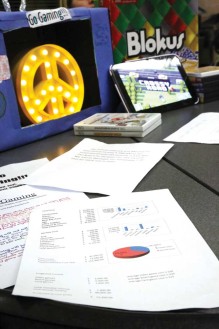
The business plan for Go Gaming shows initial costs, monthly costs and projected income.
“Coming up with the type of business was the hardest part,” said Chloe Mitzner. “At the beginning we were thinking about opening a sushi restaurant. We thought, well, how about we have a pool in it? How about we do all this stuff? And then these parents with businesses came in to talk about it … We were thinking it would only cost us like $5,000 to open up a sushi restaurant, have a pool inside, like have everything. Then we kind of knew, well, that’s not realistic. Start slower and how much money do we really want to spend?”
Go Gaming
Mitzner was one of four partners who created a plan for Go Gaming, a video and board game store. The idea they think will set them apart from other gaming stores is “a cycle.” “It’s a cycle of people will buy a game, they get tokens, then they use the tokens to test the game, and then they’ll buy that game,” says Mitzner. But the testing time is limited, she says, “One token equals two minutes and there’s a limit of 10 minutes.”
The group chose Lowry for their location, got the cost per square foot for a shop there and calculated rent and other costs based on actual prices. Alexa Coleman said the store’s annual costs are projected to be $73,440, total annual income will be $88,800, and the first year’s profit will be $15,360. “Our goal is to increase our net income,” she says, adding that they discovered their initial plan had too many employees. “We had to decrease our employees so we were not in debt.”
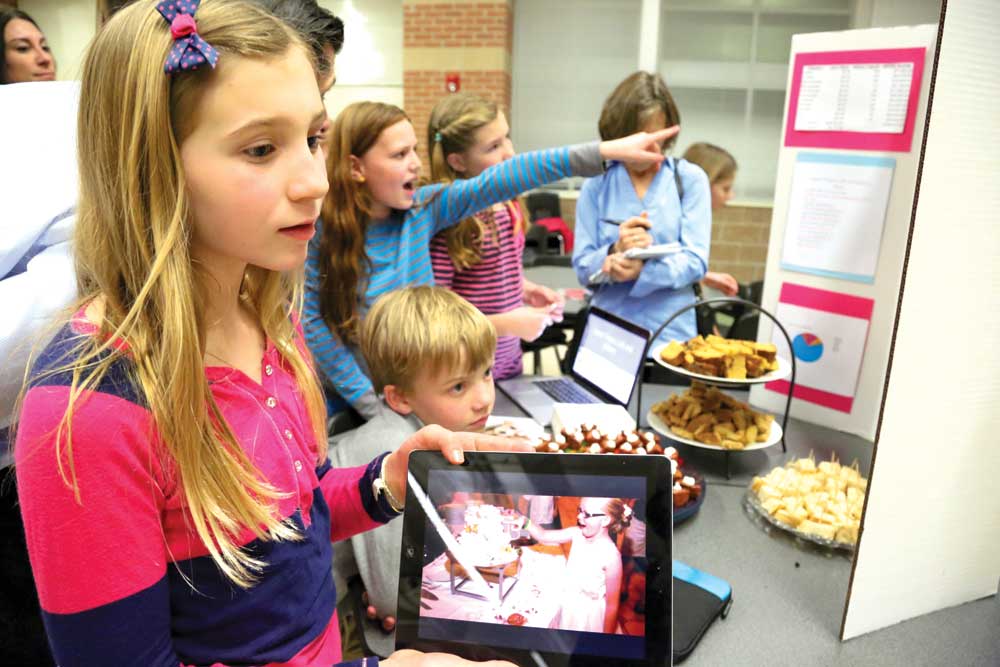
Caroline Smits shows a video of products from Sweet Treats Cafe and Bakery as Abby Smith points to one of their recipes. Katie Paul, the group’s third partner is at Katie’s left.
Sweet Treats Cafe and Bakery
The threesome Caroline Smits, Abby Smith and Katie Paul created a plan for Sweet Treats Cafe and Bakery. They agreed the bakery should donate one-fourth of its income to people with cancer and the other three-quarters should be used to make the business bigger and better. And they agreed on their recipes: two from family traditions, Cuban bread from a bakery in Tampa and some recipes they found online.
But they didn’t agree on everything. The partners had to work through differences of opinion on how much to spend on rent and where their shop should be located. Abby initially wanted to be located in the town center but changed her mind as the others pointed out there’s more traffic on Central Park Blvd, it’s closer to houses, and the rent would be lower. At the expo, the group offered free bite-sized samples … but with their newly gained understanding of profit and debt, only the first sample was free—then they charged a quarter. After calculating all their costs and expenses, these entrepreneurs determined they would make $510 in their first year.
Who Rescued Who? Pet Adoptions
Austin Harris and Sadie Halpern adopt and rescue animals for other people to adopt. “We attract customers,” says Austin as he brings up the marketing screen on his computer, “by using billboards, lamppost signs, posters, etc. And once we have enough money to afford it, we’ll use commercials.”
The business is located in the Stapleton Town Center and has kennels, a storage room for food and a pet store for supplies in a 20- by 10-foot space. The pair would help match families and pets. “We could take the pets out of their kennels,” says Halpern. “Or the dog or cat could choose you,” adds Austin.
“People who are allergic to their dog or don’t want them anymore could bring them to us. Or if we find stray dogs, we can take them in and help them.” It’s free to bring in animals, $15 for an adult dog or cat and $25 for puppies and kittens. Harris checks their business plan and adds, “If you’re looking for a new best friend, come to us. Our competition is the Denver Dumb Friends League—and if you don’t like your animal we’ll accept it back for free, where Dumb Friends League charges $30 or more.”
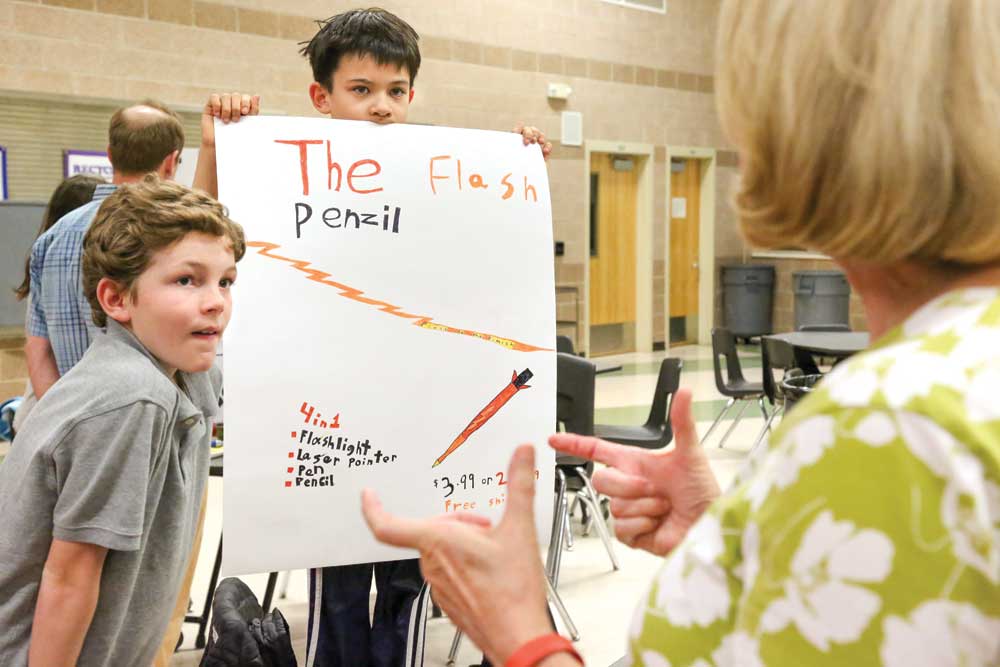
Quin Baughman (left) and Trevor Fai listen to a question about their project, The Flash Penzil.
Flash Penzil
“The reason we invented the Flash Penzil is because sometimes businessmen and businesswomen that work in a building and type on a computer for a long time, they sometimes present …”says Quin Baughman, “… and they spend a lot of money on their tools to present. You don’t want to use a yardstick for a laser pointer,” adds Trevor Fai.
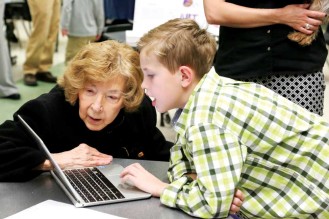
Austin Harris shows his business plan for Who Rescued Who? Pet Adoptions to his grandmother Peggy Harris.
Quin picks up the train of thought, “So we were like, why don’t we create a pen that could do all of that? We took four things that we could include into a pen. Some people would like a flashlight, some people would like a laser pointer, some people would like a pen, and some people would like a pencil.”
Costs are projected at $200 to $3,000 because, explains Fai, “some people may want to buy massive amounts while some may want to buy just two.” “We could start out small, with like three pens and once the word gets spread out it could go bam, bam, bam and get very popular and people would want to buy,” adds Baughman. “That’s when the big money comes in,” says Fai, “and we can bang out like a thousand pens.” To keep costs down, the pair says they will sell the pens at a table on the sidewalk where a lot of people walk by.




0 Comments